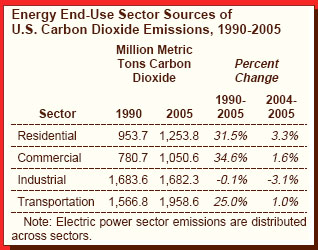American industry jumps on global warming bandwagon
American industry jumps on global warming bandwagon
mongabay.com
January 23, 2007
On the eve of President Bush’s State of the Union address, American industry is fast-jumping on the global warming bandwagon, according to an article in today’s issue of The Wall Street Journal. Yesterday the CEOs of 10 major corporations — Alcoa, BP America, Caterpillar, Duke Energy, DuPont, FPL Group, General Electric, Lehman Brothers, PG&E, and PNM Resources — asked Congress to implement binding limits on greenhouse gases this year, arguing that voluntary efforts to fight climate change are inadequate.
 US Energy Use |
“A growing number of these companies are pushing for a mandatory emissions limit, or ‘cap.’ Some see a lucrative new market in clean-energy technologies. Many figure a regulation is politically inevitable and they want to be in the room when it’s negotiated, to minimize the burden that falls on them,” writes Jeffrey Ball. “The broadening, if incomplete, consensus that fossil fuels are at least a big part of the global-warming problem signals real change in the environmental debate. The biggest question going forward no longer is whether fossil-fuel emissions should be curbed. It’s who will foot the bill for the cleanup — and that battle is heating up.”
Ball says that automakers are oil producers blaming each other for rising carbon dioxide levels, while utilities are scrambling to position themselves to minimize the downside of emissions limits. Ball notes that even Exxon Mobil, long an outspoken critic of the contention that fossil fuels are contributing to climate change, is preparing for a potential cap.
“In November, Rex Tillerson, Exxon’s chairman and chief executive, called in a speech for ‘steps now to reduce emissions in effective and meaningful ways.’ Then he listed two: boosting automotive fuel economy and cutting emissions from coal-fired power plants.”
About 80 percent of the world energy comes from fossil fuels according to the International Energy Agency
This article uses quotes from “In Climate Controversy, Industry Cedes Ground” by Jeffrey Ball.